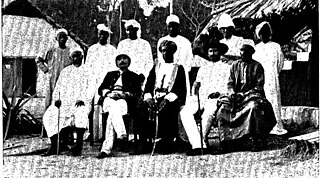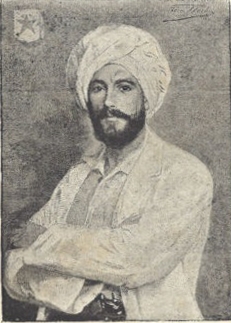
The Congo Free State, also known as the Independent State of the Congo, was a large state and absolute monarchy in Central Africa from 1885 to 1908. It was privately owned by King Leopold II, the constitutional monarch of the Kingdom of Belgium. In legal terms, the two separate countries were in a personal union. The Congo Free State was not a part of, nor did it belong to Belgium. Leopold was able to seize the region by convincing other European states at the Berlin Conference on Africa that he was involved in humanitarian and philanthropic work and would not tax trade. Via the International Association of the Congo, he was able to lay claim to most of the Congo Basin. On 29 May 1885, after the closure of the Berlin Conference, the king announced that he planned to name his possessions "the Congo Free State", an appellation which was not yet used at the Berlin Conference and which officially replaced "International Association of the Congo" on 1 August 1885. The Free State was privately controlled by Leopold from Brussels; he never visited it.

Tippu Tip, or Tippu Tib, real name Ḥamad ibn Muḥammad ibn Jumʿah ibn Rajab ibn Muḥammad ibn Saʿīd al Murjabī, was an Afro-Omani ivory and slave owner and trader, explorer, governor and plantation owner. He worked for a succession of sultans of Zanzibar and was the Sultan of Uterera, a short-lived state in Kasongo, Maniema ruled by himself and his son Sefu who was an emir of the local WaManyema.
Colonization of the Congo Basin refers to the European colonization of the Congo Basin of tropical Africa. It was the last part of the continent to be colonized. By the end of the 19th century, the Basin had been carved up by European colonial powers, into the Congo Free State, the French Congo and the Portuguese Congo.
The pre-colonial history of the modern-day Democratic Republic of the Congo encompasses the history of the Congo Basin region up to the establishment of European colonial rule in the era of New Imperialism and particularly the creation of the Congo Free State and its expansion into the interior after 1885. As the modern territorial boundaries of the Democratic Republic of the Congo did not exist in this period, it is inseparable from the wider pre-colonial histories of Central Africa, the Great Lakes and Rift Valley as well as the Atlantic World and Swahili coast.

The Luba people or Baluba are a Bantu ethno-linguistic group indigenous to the south-central region of the Democratic Republic of the Congo. The majority of them live in this country, residing mainly in Katanga, Kasaï, Kasaï-Oriental, Kasaï-Central, Lomami and Maniema. The Baluba consist of many sub-groups or clans.

Msiri founded and ruled the Yeke Kingdom in south-east Katanga from about 1856 to 1891. His name is sometimes spelled 'M'Siri' in articles in French. Other variants are "Mziri", "Msidi", and "Mushidi"; and his full name was Mwenda Msiri Ngelengwa Shitambi.

The Congo Arab war or Arab war was a colonial war fought between the Congo Free State and Arab-Swahili warlords associated with the Arab slave trade in the eastern regions of the Congo basin between 1892 and 1894.

Louis-Napoléon Chaltin (1857–1933) was a Belgian career soldier and colonial official notable for his service in the Congo Free State during the late 19th century.

The indigenous people within the kasai basin up to Maniema understood themselves to be descendants of "AnKutshu Membele", then in the 20th century many accepted the imposed term Tetela . "Batetela" is now understood as an ethnic group of the Democratic Republic of the Congo, most of whom speak the Tetela language.

The Zappo Zaps were a group of Songye people from the eastern Kasaï region in what today is the Democratic Republic of the Congo. They acted as allies of the Congo Free State authorities, while trading in ivory, rubber and slaves. In 1899 they were sent out by the colonial administration to collect taxes. They massacred many villagers, causing an international outcry.
Muhammad bin Khalfan bin Khamis al-Barwani, commonly known as Rumaliza, was an Arab trader of slaves and ivory, active in Central and East Africa in the last part of the nineteenth century. He was a member of the Arabian Barwani tribe. With the help of Tippu Tip he became Sultan of Ujiji. At one time he dominated the trade of Tanganyika, before being defeated by Belgian forces under Baron Francis Dhanis in January 1894.

The Yeke Kingdom of the Garanganze people in Katanga, DR Congo, was short-lived, existing from about 1856 to 1891 under one king, Msiri, but it became for a while the most powerful state in south-central Africa, controlling a territory of about half a million square kilometres. The Yeke Kingdom also controlled the only trade route across the continent from east to west, since the Kalahari Desert and Lozi Kingdom in the south and the Congo rainforest in the north blocked alternative routes. It achieved this control through natural resources and force of arms—Msiri traded Katanga's copper principally, but also slaves and ivory, for gunpowder and firearms—and by alliances through marriage. The most important alliances were with Portuguese–Angolans in the Benguela area, with Tippu Tip in the north and with Nyamwezi and Swahili traders in the east, and indirectly with the Sultan of Zanzibar who controlled the east coast traders.

Sefu bin Hamid or Sayf bin Hamed was an Arab Zanzibari slave trader and administrative official. The son of Tippu Tip, he was killed while fighting in the Congo–Arab War.

Joseph François Lippens was a Lieutenant in the Force Publique of the Congo Free State during the Congo Arab War. He was killed by the soldiers of Sefu bin Hamid.

Henri-Auguste De Bruyne was a sergeant in the Force Publique of the Congo Free State who was sent to Kasongo in 1890. He was killed by the soldiers of Sefu bin Hamid.

The Sultanate of Utetera (1860–1887), also referred as Tippu Tip's state, was one of the Arab sultanates established in eastern Africa. It was a 19th century short-lived state ruled by the infamous Swahili slave trader Tippu Tip and his son Sefu. The capital of the state was the town of Kasongo, located in modern Maniema Province, Democratic Republic of the Congo. Tippu Tip's controlled territory reached as far to eastern Kasai and to Aruwimi Basin in the west.

Captain Jérôme Becker was a Belgian explorer and artillery officer who led several expeditions into Central Africa on behalf of the International African Association (AIA) and the Congo Free State, participating in some of the AIA's earliest explorations of Central Africa.

Congolese nationality law is the nationality law for the Democratic Republic of the Congo. It is regulated by the Constitution of the Democratic Republic of the Congo, as amended; the Congolese Nationality Code, and its revisions; the Congolese Civil Code; and various international agreements to which the country is a signatory. These laws determine who is, or is eligible to be, a national of the Democratic Republic of the Congo.
Stanley Falls District was a district of the Congo Free State. It covered most of the eastern part of the colony along the Congo River south from Stanleyville.
Louis-AIbert-Marie-Joseph Haneuse was a Belgian soldier and colonial administrator.













